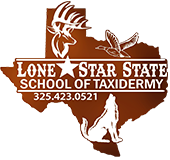Additional Course Info
Each course will be evaluated by the instructor and critiqued with the students. Mounts will be evaluated for quality and results are recorded in the student record. The students will be allowed to use the repetition course to improve in areas where they are struggling to produce taxidermy products to a satisfactory level. I f a student fails to bring their taxidermy quality to a satisfactory level within the allotted time frames the student will be dismissed for lack of progress. Readmission will be determined by the school. The student will be required to take a written test at the end of the course which will be 20% of their final evaluation and they will be evaluated on their final mounts. To receive a certificate of completion the student must pass the written exam and receive an evaluation of “good” on their final projects. The school maintains attendance and evaluation records for ten years and is available upon request.
A cumulative grade average of at least 70% is required for the student to receive the course certificate. Students will receive written notification of their progress at the midpoint and end of each evaluation period. A student who is not making satisfactory progress at the midpoint will be placed on academic probation for the remainder of the progress evaluation period. The school director will counsel the student placed on probation prior to the student returning to class. The date, action taken, and terms of probation will be clearly indicated in the student’s permanent file. If the student does not achieve satisfactory progress by the end of the probationary period, the student’s enrollment will be terminated.
Under Texas Education Code, Section 132.061(F)
A student who is obligated for the full tuition may request a grade of “incomplete” if the student withdraws for an appropriate reason unrelated to the student’s academic status. A student who receives a grade of incomplete may reenroll in the program during the 12-month period following the date the student withdraws and complete those incomplete subjects without payment of additional tuition for that portion of the course or program.
Student attendance and participation are mandatory for training. Students must have 100 percent attendance. Missed days cannot be made up during class sessions. A student may be dismissed from the program for violation of the attendance policy.
A student whose enrollment was terminated for violation of the attendance policy may not reenroll before the start of the next progress evaluation period. This provision does not circumvent the approved refund policy.
Students who face unexpected illness or family emergencies will be allowed to return to complete the courses missed during a future class session but must be granted a leave of absence by the school director.
The school director may grant a leave of absence after determining that good cause is shown. A student may have no more than two leaves of absence in a 12-month calendar period, and may be on leave of absence no more than 30 calendar days during that 12-month calendar period. School attendance records will clearly define the dates of the student’s leave of absence. A written statement of the reason(s) leave of absence was granted, signed by both the student and the school director indicating approval, will be placed in the student’s permanent file. A student’s enrollment in the program will be terminated if the student fails to return as scheduled from an approved leave of absence.
A high level of civility and respect are maintained by students and instructors at all times. Abusive or inappropriate behavior will result in immediate dismissal from the program. The school does not use a probationary period.
Students must address their concerns with the school or any of its educational programs. If the student is dissatisfied with the school’s response to their complaint or are not able to file a complaint with the school, they can file a formal complaint with TWC, as well as with any other relevant agencies or accreditors, if applicable. Information on filing a complaint with TWC can be found on TWC’s Career Schools and Colleges Website at http://www.texasworkforce.org/careerschools.
Texas Workforce Commission
Career Schools and Colleges, Room 226T
101 East 15th Street
Austin, Texas 78778-0001
Phone: (512) 936-6959
http://csc.twc.state.tx.us/

